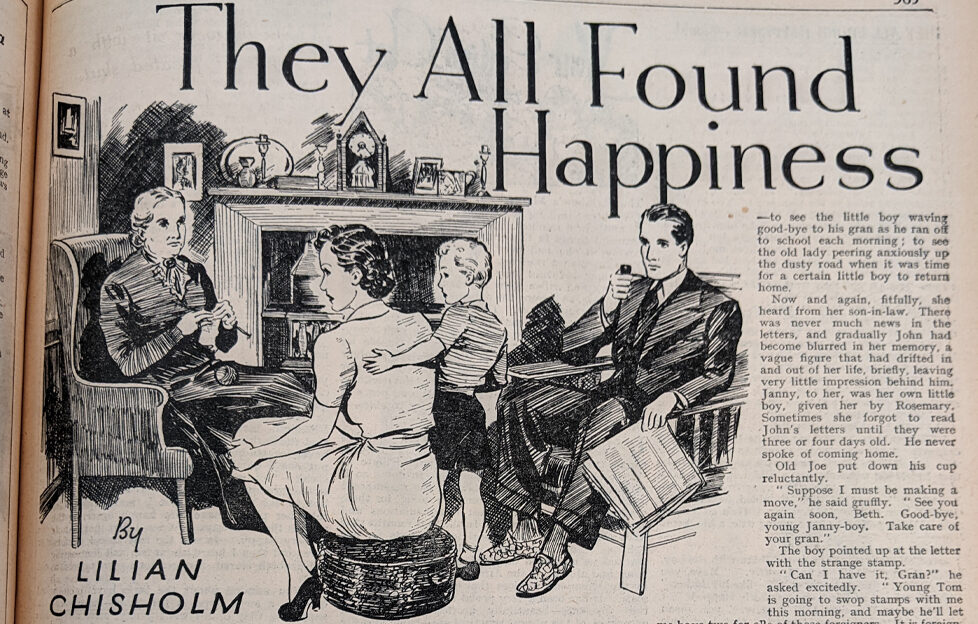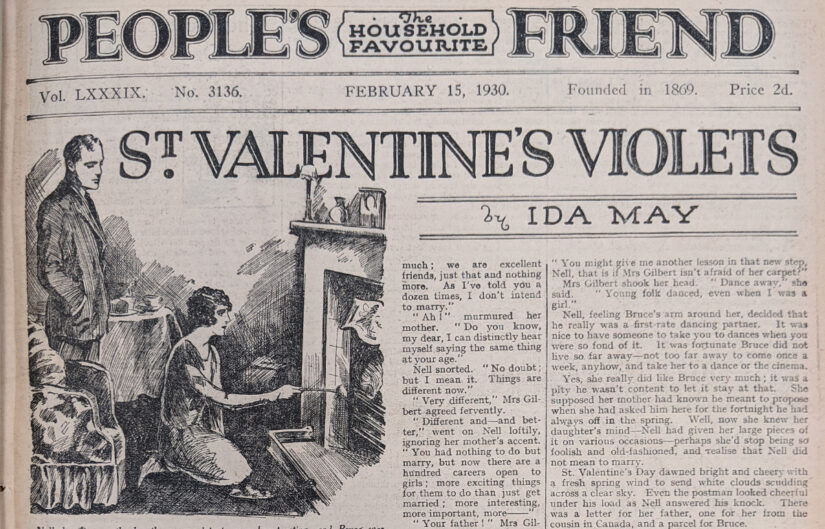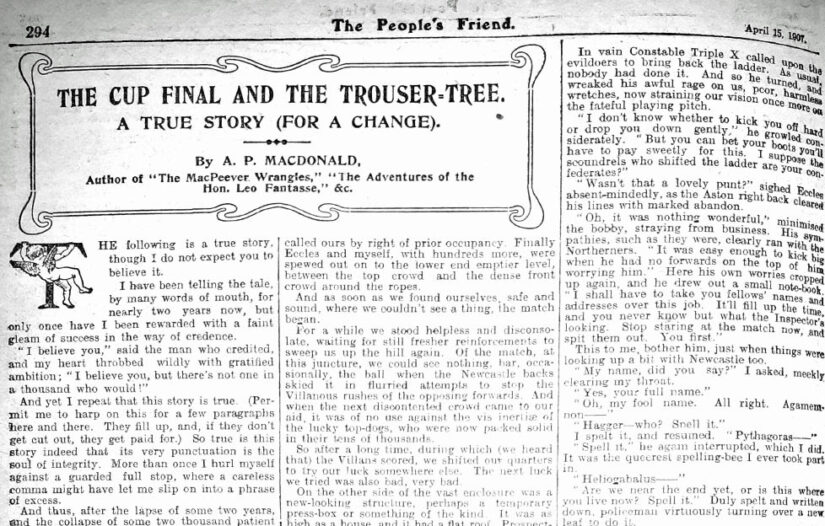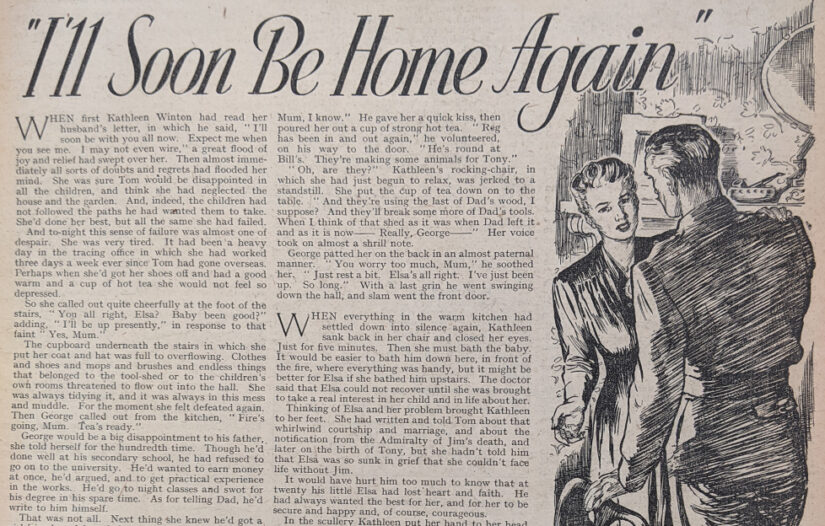
The fourth episode of Reading Between The Lines is “They All Found Happiness” by Lilian Chisholm, first published April 29, 1940. This story rubs the team up the wrong way slightly! Jacqueline, Barry, Lucy and Tracey talk character development, what story illustrations should give away and how much magazines should reflect world events. You can read along with the story as you listen, and let us know what you think.
The letter had arrived by the first post, when Elizabeth was in the middle of bathing Janny. She had propped it up on the mantelshelf, given the postman, old Joe, a cup of nice hot tea, exchanged a bit of gossip with him, meanwhile rubbing down the sturdy little boy before the kitchen fire.
“My, but he’s growing, Elizabeth,” remarked old Joe, warming his hands round the large breakfast cup. “Grows more like you every day, so he do. Anyone can see he’s your daughter’s son, all right!”
“Get along with you!” she told him sharply, but for all her quick tongue, her cheeks glowed with pride, her faded old eyes were happy. Janny—her little world.
She had never dreamed heaven would be so kind, when all else was taken away from her, as to give her little Janny. Always—for just as long as she could remember—she had dreamed of the day when she would hold a son in her arms, but that day had never come. Only little Rosemary, so delicate, so frail, so small—and then very soon afterwards, tragedy had stalked across her life, and left her a widow, at twenty-five, with a delicate child to rear single-handed. All her dreams of a little son had died then, and she had devoted herself, body and soul, to her little girl.
She’d made a pretty good job of it, too, she always thought secretly. Little Rosemary was so different to the other village children. They were big and strong—and she was as delicate and as dainty as a flower, as shy and winsome as a fairy. “Too good for this world, you mark my words!” the old woman of the village had whispered amongst themselves, but old Elizabeth had scoffed at them.
“She looks tiny,” she told them firmly. “But for all that she’s as strong as a wire, inside.”
Only—wires snap. Rosemary had grown up from babyhood to childhood, from childhood to radiant, beautiful girlhood—and John had come into her life. Elizabeth had hidden her fear and listened to Rosemary’s eager talk, noticed her shy blushes, her starry eyes. It seemed hard that, after all these hard, work-filled years, she had to lose her little girl, but if that way meant happiness for Rosemary, that must be the way. John was a fine man, upright, strong—he would look after Rosemary, protect her, just as Elizabeth had done.
For one long, radiant year Rosemary had her happiness with John. Then on a soft spring night, a little son was born, and the flame of Rosemary that had flickered so feebly, went quietly out.
John brought the little boy to Elizabeth, his face haggard, his eyes distraught.
“I feel I cannot love him, Gran,” he said thickly. “It’s as if—as if—”
“I know, son,” she said quietly, hiding her own aching grief. “It seems almost as if the bairn took your wife from you, doesn’t it? But maybe it was for the best—if only we could understand. Rosemary wanted to give you a son more than anything in the world. At least you can remember that.”
But he could find no comfort in the thought. A few weeks later he had packed his few belongings, closed up the little farm where he had taken his young bride, and gone abroad, leaving his son in Elizabeth’s care.
“You look after him, Gran,” he had said when he came to say goodbye. “Rosemary would have wanted you to have him, I know. She wanted him called Johnny.”
And so, for five years, little “Janny”—his own version of the name, and one which had become commonly accepted in the village—had lived with Elizabeth in the little cottage where his own mother had been born. They were a queer couple, the sturdy little boy, who seemed to have inherited his father’s strength along with his mother’s sweetness and kindliness, and the frail old woman whose life was dedicated to the boy. It was a common sight in the village to see the odd couple going to church on a Sunday, tending the little flower-strewn grave resting in the sun-filled corner of the churchyard—to see the little boy waving goodbye to his gran as he ran off to school each morning; to see the old lady peering anxiously up the dusty road when it was time for a certain little boy to return home.
Now and again, fitfully, she heard from her son-in-law. There was never much news in the letters, and gradually John had become blurred in her memory, a vague figure that had drifted in and out of her life, briefly, leaving very little impression behind him. Janny, to her, was her own little boy, given her by Rosemary. Sometimes she forgot to read John’s letters until they were three or four days old. He never spoke of coming home.
Old Joe put down his cup reluctantly.
“Suppose I must be making a move,” he said gruffly. “See you again soon, Beth. Goodbye, young Janny-boy. Take care of your gran.”
The boy pointed up at the letter with the strange stamp.
“Can I have it, Gran?” he asked excitedly. “Young Tom is going to swap stamps with me this morning, and maybe he’ll let me have two for one of these foreigners. It is foreign, isn’t it, Gran?”
She wiped her hands on her apron and reached for the letter, perching her specs on her nose.
“Not exactly foreign, Janny,” she murmured—might as well see what the lad had to say. “See, it’s a beauty of a stamp all right. All the way from Canada, mind you. Let’s see what your father has to say.”
The little boy waited, anxious to be off on his games. His father . . . just a name, nothing more. He had never known him, never seen him, to his memory. Other boys talked about their dads, fine, mysterious people who taught a boy great things—showed them how to whittle a boat, how to track rabbits, how to tie knots that wouldn’t come undone. Only last week one of the boys, laughing at Janny’s attempts at knot-tying, had scoffed at him.
“Janny ties Grannie’s knots!” he had sneered, and all the other boys had laughed, some of them a little uncomfortably. Janny had thought a lot about it since. There seemed to be something different about him all of a sudden. Other little boys didn’t live with their grannies. They had mothers and dads.
Mother was dead, of course. He knew all about her—she had been a lovely lady, the sort of mother a boy likes to have. But Dad—Gran never spoke much about him. Just that he had gone off to Canada and stopped there. Sometimes in the middle of the night Janny would wake up and remember that his dad hadn’t loved him enough to wonder what sort of lad he had grown up to be.
He looked up sharply as his gran uttered a strange little sound. She pulled forward a chair and sat down, re-reading the letter. The boy stood watching, awkward, suddenly afraid.
“Dad isn’t ill, Gran?” he asked, puzzled. She shook her head and pulled the boy towards her.
“They shan’t do it!” she said sharply, with an anger he had never seen before in her eyes. “They can’t do such a thing—it isn’t human!”
“Is Dad cross with you, Gran?” he asked nervously, and she thrust the letter into her apron pocket and pushed him to the door.
“Run along, child—go out and play. It’s nothing—nothing!”
When he had gone she sat for a long time, staring at the fire. John was coming home. That, in itself, was a small matter—but he was bringing his wife with him.
His wife. “I know you will be glad I have found happiness, Gran, dear,” he had written. “And you will love Sonia. She is so anxious to see her new little son. I feel I have neglected the boy shockingly, but now at last I can offer him a real home, with a mother and father. Quite suddenly I am anxious to see my boy again, and very soon we shall be there with you.”
Her lips twisted bitterly as she tore the letter to shreds. “Quite suddenly,” she mocked. “Quite suddenly you want to see your son! You and your new wife—calmly deciding to take your boy! But you shan’t—you’re not going to take him from me! I’ll fight with every ounce of strength left in me—but you shan’t take Janny away from me!”
In the afternoon she put on her best hat and coat and went to see the vicar. Elizabeth’s faith was simple—with a childlike trust in the man who had taught her about God.
“You’ll tell me how to manage, sir,” she said, sitting in the cosy little study. “You see, strictly speaking, the boy belongs to me, doesn’t he now?”
The old man’s eyes were very gentle. He had known Elizabeth long and loved deeply.
“My dear,” he said quietly, “you have given Janny everything—love, care, instruction, health. Nobody could admire you for what you have done more than I do. But John is still the boy’s father.”
She looked at him rebelliously.
“He hasn’t done anything for the boy,” she said defiantly. “He was content enough to leave the boy with me all these years—you aren’t saying it’s right that he should suddenly get a whim into his head and come home and take the boy away from me? I—I couldn’t”—her old lips trembled weakly—“I couldn’t bear to lose the boy, sir. He’s all I have now. John is young, he has a young wife, a life before him—”
The old man leaned forward.
“And all those things he would share with the boy, Elizabeth, my dear,” he said softly. “Have you realised that? Janny is young, too—like his father.”
She stared at him like a child unfairly slapped.
“You mean,” she said doubtfully, “you mean I’m too old to look after Janny? But I’ve done everything, sir—the lad has never wanted for anything, and I can still work along with the best of them—”
The old man rose to his feet, feeling suddenly tired to death. So often of late he had this feeling when one of his parishioners came to him, trusting in him implicitly.
“My dear,” he said impulsively, “think of Rosemary. Try and imagine what she would want you to do. After all, she loved John, didn’t she? When she bore him a son she was very proud, remember? That last night when you fetched me to her, do you recall what she whispered to us?”
“’I’m glad to do this—for John. I would do anything in the world to make him happy, Mother.’”
Elizabeth got up stiffly, smoothed her black gloves. Her face was very pale, but there was a quiet peace about her eyes.
“Thank you, sir,” she said simply. “Reckon I was forgetting that. I’m much obliged to you. If the boy wants Janny, I guess he’ll have to take him.”
The days passed with incredible swiftness, bringing that dreaded day nearer and nearer. She had said nothing to the boy, afraid to spoil these last few precious days. They went everywhere together—she gave him old, long-promised treats—a trip into town, where she bought him his first real suit, to wear on the day when—when—
She bought him a tie, a pair of strong boots. She took out preciously-saved shillings for a new knife.
But Janny looked up at her, flushed.
“Not a knife, Gran, thanks,” he said awkwardly. “You see, a chap likes a man to buy a knife for him. You—don’t mind, Gran?”
No knife in the world cut have cut her more sharply than that. She understood now what she had never noticed, or never wanted to notice before. The boy was growing up, beginning to realise that other boys didn’t go about with an old lady; didn’t have a silly, fussy old lady bringing them to school on wet days in case they got their feet wet—didn’t have a fussy old woman writing to teacher to have homework excused because he had to be in bed by seven. It was time Janny had a father to look after him.
All the fight went out of her. For the two days remaining she was quiet, brooding, so that little Janny went about unhappily, wondering why his little world had suddenly gone lop-sided.
On the day when they were to come, Elizabeth rose early to clean the house. “She,” when she came, should find everything perfect. No doubt she would be a grand lass, with fine airs—somebody who had banished the memory of Rosemary from John’s mind and enthroned herself in the memory’s place. Elizabeth hated her with a deep, intense hatred. Her own little girl, banished and forgotten — a stranger enthroned in her place, a stranger who would take Rosemary’s little son away from his real place. Maybe she would be cruel to him—and one day, when she had children of her own, maybe Janny would take a back seat.
They arrived at eleven when Janny was at school. Elizabeth was at the gate to meet them.
“John—John, my boy—”
He had not changed. She knew that moment he took her in his strong arms. He was the same man who had captured her little girl’s heart, big, strong, gentle. And somehow, in the way that he held her, she knew that Rosemary had not been banished. There might be another woman in his life, but Rosemary was still there in his heart.
“Gran, dear,” he said quietly, “this is Sonia. You two ought to love each one another.”
Elizabeth turned. She saw a small girl, little more than a child—strong, sturdy, as brown as a berry. The kind of woman, she thought bitterly, who would bear children easily, who would be strong through the years, a real helpmate to her husband, ready to fight any battles with him, side by side. How could he love such a woman, after Rosemary? Rosemary—so sweet, so exquisitely beautiful?
“Come in,” she said stiffly. “You must be tired. Janny will be home soon.”
Looking at the girl, she was surprised to see a sudden light in the dark eyes. Yet—how could she be anxious about Janny? A new bride, young; would any such woman be anxious to saddle herself with a stepson?
“You go up to your own boy’s room, son,” she said to John. “The little room at the top of the stairs. I’ve put water and towels for you there. I’ll take—your wife—to my room.”
It had been Rosemary’s room—once. Elizabeth felt a pang of jealousy shoot through her as the girl went quietly to the washstand and began to tidy her hair. It was unfair—cruel—bringing this stranger, this outsider, here—into the very heart of Rosemary’s life. How could John be so cruel? Had he—could he have forgotten his little first wife, after all? Had her memory been too frail to last?
“You don’t like me, do you?” the girl said quietly, startling Elizabeth out of her dreams. “I’m sorry. I was hoping you would.”
Elizabeth coloured, smoothed the bedspread nervously.
“Oh, come, dear,” she said hesitantly, “how can you say that? We scarcely know one another, do we?”
For a moment the girl stared at Elizabeth, then quite quietly she sat down beside Elizabeth.
“You needn’t hate me,” she said flatly, and Elizabeth, turning amazed eyes upon the girl, saw that the dark eyes were full of tears. “You see—he never forgets her, not for a moment. Please”—she put out a quick brown hand as Elizabeth made to speak—“let me tell you—maybe it will help you to tolerate my presence here. You loved Rosemary—but so did he. Just at first I thought that I could take her place, make him happy again, but she’s always there—always. When I first met him I was so very happy. It was the first time I ever fell in love, and then I heard about this little boy—”
Elizabeth stared, a queer look growing in her old eyes.
“You minded about the little boy?” she asked quietly, a swift hope in her heart—supposing, oh, supposing they didn’t want Janny after all? The girl raised her head.
“I can never have any children, Gran,” she said simply. “I had an accident long ago and the doctor told my mother. It used to break my heart sometimes. Then I met John, and he told me about his little boy. I thought heaven was being too kind to me, giving me John to love and a little son into the bargain. You don’t know how I planned things, Gran—how I would grow to think Janny was my very own, almost as if he had grown in my own body, part of me—but now, it all seems so hopeless. Rosemary,” her voice sank to a whisper, “Rosemary is always there, standing between us—and I can’t pretend that John loves me, or that her little boy is mine.”
For a long time the two women sat there on the bed, silent. Elizabeth’s eyes travelled slowly round the room until they found the photograph that always stood on the windowsill. It was the last one they had taken of her—when she was expecting Janny. Just the head and shoulders—as fragile as Dresden china, as beautiful as a half-opened flower. Little Rosemary, who had given up her life so happily—for John.
“I would do anything in the world for John, Mother.” Her whisper seemed to go round and round the room, round and round in Elizabeth’s brain. She had never wanted anything but that—John’s happiness. And here was John’s happiness threatened—his second wife unhappy, Janny’s future uncertain, John’s contentment most certainly threatened. Three of them torn and uncertain, unable to rest because of the poor little ghost of Rosemary—Rosemary who had always wanted them to be happy.
And then, very slowly, Elizabeth put out a hand and touched the young brown one close beside her.
“Listen, my dear,” she said firmly, “I was never going to tell you, but now I think you ought to know. Some time ago—it must have been when John first met you—he wrote to me. He told me about you, and then he added these words: ‘Sometimes I hate myself, feeling I am being disloyal to Rosemary in loving Sonia. But, Gran, try and understand we were very young, Rosemary and I—this is so different. Surely Rosemary would not have begrudged me this great happiness? I have never loved like this before—it is something different to anything I ever knew.’”
The girl was staring at her, a growing wonder in her dark eyes.
“He said—that?” she asked huskily. “About—about me? Oh, Mother—are you sure?”
Her eyes fixed bravely on the photograph, Elizabeth nodded.
“Quite—sure” she lied again, her heart thumping heavily. “So you see—you can be quite happy. John loved my little girl, as we all loved her. He was very kind to her, very gentle and loving—as he might have been to any little girl who was lovable, and sick, and delicate. He always had a soft spot in his heart for poor broken things, did John. Sometimes I believe that was why he married her—to take care of her.”
Warm arms were thrown around her, a soft, fresh face pressed hers.
“Oh, Gran,” whispered the young voice, “I’ve been so stupid. I—I believe I’ve almost hated little Rosemary. Now—I feel only pity for her—poor, dear little girl. I’ll be so good to Janny, Gran—for—for her sake.”
There was a joyous shout from below—a young, excited voice:
“Gran—Gran—did you see who’s here? My father—my real dad! I’ve got a dad like the other boys—and he can make better boats than any of the other dads; and—and—oh, Gran—he says it doesn’t hurt boys to get their feet wet sometimes, and—Gran! Where are you?”
She took it all bravely. She had only to keep up until they had all gone, then she could let go. She could pray to heaven to forgive her for all the awful lies she had told, and ask her little girl to forgive her for what she had said about her. Little Janny didn’t mean to be cruel—he wanted a normal life like other children, not to be tied all his young life to an old woman’s apron-strings.
“Here, darling!” she called, as his feet stumbled excitedly up the stairs. “I’m with your new—mother.”
He faced them shyly, a flushed, sturdy little boy, with Rosemary’s eyes. He held out his hand to Sonia.
“How do you do?” he asked politely. “It’s very kind of you to want to be my mother. But, you see, I have a mother, thank you.”
For a moment there was a strained silence. Then Sonia looked at Elizabeth and smiled bravely.
“He’s right,” she said quietly. “We must never take Rosemary away from him. No, dear—I’m not your mother—I’m just somebody who wants to look after you, and love you very much. Do you know what your daddy calls me? He calls me Sonny—would you like to call me that, too? After dinner we’ll ask Gran to take us up to put some very special flowers on your mother’s grave—to thank her for leading you to me, shall we?”
And then it was evening and they were sitting by the fire.
“And now,” said John, tapping out his pipe, “isn’t it time we discussed what we’re going to do, Sonia?”
Elizabeth sat very, very still. Now it was coming—the last fence she had to take—and the stiffest.
“Of course, you want Janny,” she said quietly.
She saw John take Sonia’s small brown hand between his strong, gentle fingers, and a smile of new understanding flashed between them. So—she had not lied about little Rosemary in vain. Two hearts had found happiness, and maybe, she realised suddenly looking at John, maybe she had not lied so very much after all. There was a new quietness about John—a serenity, a calm. In the old days he had been loving, but always with the love that a man gives to a little child. Supposing she hadn’t lied—up there in Rosemary’s room—at all?
“Oh, yes,” Sonia was saying eagerly, “we want little Janny terribly. We were thinking of opening up the farm again—John is tired of Canada—and I guess any place is home to me, so long as John and his little boy are there—so that’s what we’ve decided to do. The present tenants are anxious to vacate, fortunately—”
The firelight flickering on Elizabeth’s face showed it pale and lonely.
“You—you’ll let me see him often?” she asked in little above a whisper.
For a moment there was a silence in the room. Then, very gentle, Sonia knelt down in front of Elizabeth and took her two work-worn hands between her firm young fingers.
“Why, you dear, stupid old Gran!” she said shakily. “You didn’t suppose for one moment we were going to take Janny away from you? Why, naturally—you’re coming, too!”
Read previous stories and updates from the podcast.




